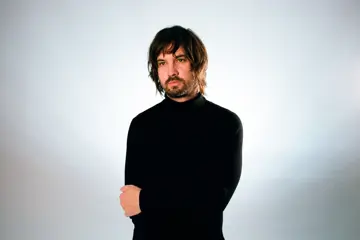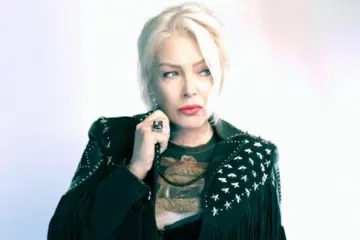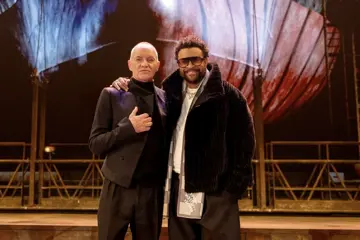 Sleater-Kinney
Sleater-KinneySpeaking to The Music as summer is starting to break in Portland, Sleater-Kinney singer and guitarist Carrie Brownstein describes The Center Won’t Hold as a “much darker, more personal record” than 2015’s comeback album No Cities To Love. It’s also their last with their drummer of 23 years, Janet Weiss.
Produced with Annie Clark aka St Vincent, The Center Won’t Hold was written in an entirely new way, the band sending each other demos over email, rather than working songs out in the studio, with Brownstein living in LA, and Weiss and singer and guitarist Corin Tucker in Portland.
“I was sort of pleasantly surprised that, despite the physical distance between us, the music vernacular of the band was so entrenched that we could sort of transcend the miles between us and still communicate sonically with one another as we wrote the record.”
No Cities To Love was Sleater-Kinney’s return after nine years working on their own projects. In the years between 2005’s The Woods and their comeback, Tucker released two solo albums, Brownstein and Weiss reunited as part of Wild Flag, and Brownstein co-created hipster sketch comedy Portlandia with Fred Armisen.
Don't miss a beat with our FREE daily newsletter
The album, for Brownstein, was set out from their first seven albums with “bigger group choruses and leaning into melody a little bit more”, and achieved what it set out to do – “announcing our return and showcasing that we weren't just back for the sake of nostalgia or sentimentality”.
She notes that they were almost able to coast on the fact that people were enthusiastic about Sleater-Kinney’s return. So, the pressure to make a new artistic statement – to demarcate a kind of “middle period” of Sleater-Kinney – was actually felt on The Center Won’t Hold.
“You can't create music or art by consensus. You have to take risks and challenge yourself."
“You can't create music or art by consensus. You have to take risks and challenge yourself. So, I think, if anything, the pressure was both a freedom to do whatever we wanted because it was our tenth record [including 2017’s Live In Paris], but also pressure to do something that just didn't sound like, ok, well, they're just going to make a mid-period version of their earlier records.
“It felt like it needed to step out from that. I don't think changes are linear, I think each album is kind of its own world. And you kind of have to commit to that world, and then you can deviate later.”
The personal nature of the record is also ardently political, using personal narratives to express their view of the fractured state of America, and the world.
“We were kind of surveying the political and cultural landscape and assessing its fractiousness and brokenness and tumultuousness and trying to couch that in personal narratives. And a lot of those personal narratives were about a despair and despondency in relation to the environment, and to the present day.”
On the cover for first The Center Won’t Hold single Hurry On Home, Weiss and Tucker, dressed in black, flank Brownstein in a transparent overcoat. While her back is turned, her head is twisted 180 degrees to stare down the camera. It’s the first time the band has appeared on the cover of their own record since 1999’s The Hot Rock. Brownstein, now 44 years old, declares, “It’s all my own butt.”
“All during our 20s and 30s, we never showed anything really on our bodies – not that we wanted to, but you know, it's just we never even thought to do it. There was something sort of amusing to us in waiting until each of us was sort of solidly middle-aged when we were going to subject people to our bodies and in a way that was very unsettling, you know – it was the head on backwards.
“We didn't want it to be titillating. It's obviously not, it's sort of grotesque, and we wanted to speak to the grotesqueness of it and to the sense that something was very wrong. There was something that was sort of dissociative and disjointed about it.”
In a callout posted online at the end of June, Sleater-Kinney asked for photographs from fans that “celebrat[e] your body as a means of resistance”. The Center Won’t Hold explores that idea, both musically and lyrically, asking “how much can a body withstand trespass and trauma and chaos?”
“We use low end on this record as a way of speaking about something that is grounded – a certain kind of work and choreography that is often ascribed to women of having to sort of, you know, be steady and hold things down. A lot of these narrators are right at that place of breaking.
“I feel like the female body and bodies in general that are worn down by age and loss and subjugation and oppression, they're all over this record, in each of the songs, in forms of despondency, or some of them are kind of embracing the chaos and the corruption of it.”
To celebrate her body as a means of resistance is for Brownstein a means of survival.
“To me it honestly means to want, to actually desire, to wake up; to not want to die; to want to continue. Sometimes I think it's easier, these broad forms of participation and action, you know, because they are communal, like to go to a march or a rally or, in a more passive way, to post something on social media – those are important, but there's a fulcrum there of community. What's harder is to wake up with yourself and survey the landscape and feel like you deserve to continue, that this world is giving you enough to allow you to go on.
“When I think about the body as a place of resistance, I really think it's sort of like the last barrier we have between like optimism and like full nihilism. There has to be a will inside of that body – you can perform all sorts of joy, of outward joy, that can be farcical or false or even just a masquerade. But to really wake up and want to be alive for a day in this world right now I think is a lot for many people.”
"To really wake up and want to be alive for a day in this world right now I think is a lot for many people.”
It’s through her music and writing that she becomes “an active participant in both resistance and survival”. But that engagement isn’t entirely for her own sake – it’s also for other people. “Because other people’s work and art and songs are the thing that keep me awake and alive,” Brownstein says.
That art in particular is as diverse as Sarah DeLappe’s play The Wolves to Bruce Springsteen’s live show to books by Tommy Orange and Viet Thanh Nguyen and music from Kim Gordon.
“I try to move through the world as a curious person,” Brownstein says. “If you make things, you have to take time off for input as well. I think even if it's not a specific writer or artist, I try to just allow a certain amount of intake and input.”
Speaking to Jimmy Fallon on The Tonight Show early last year to promote the final season of Portlandia, Brownstein was exposed as a fan of The Bachelor. When The Music gives her a quick debrief on the Australian franchise, from the jilted season six finale to the existence of a bespectacled ‘astrophysicist’, Brownstein says that, for her, the series has “lost a little of its lustre”: “But it sounds like Australia's still going strong, which is reason enough to get there to tour.”
Sleater-Kinney are a couple of months away from a string of tour dates around North America and Europe, their first without Weiss since 1995.
While Brownstein was upset and surprised by Weiss leaving the band, she is grateful for her “integral and powerful” contribution to The Center Won’t Hold. All she and Tucker can do now, she says, is “look to the future and think of this as a new chapter”.
“Not all change is something that's expected or comfortable, but I think that's kind of what we've been given and handed. Corin and I feel like we have a job to do, which is to bring this album that we're really excited about, that Janet's work is really amazing on, to people.”















